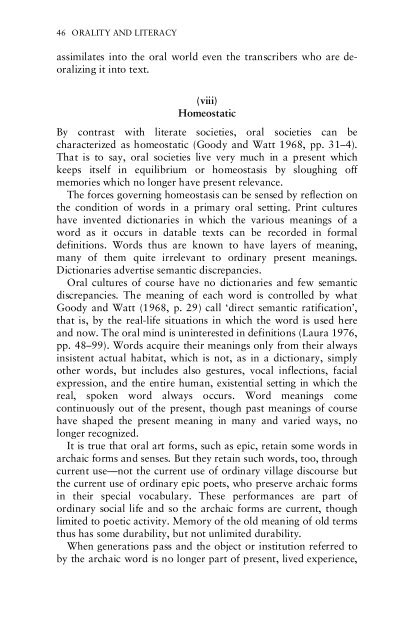Orality and Literacy: The Technologizing of the Word - Monoskop
Orality and Literacy: The Technologizing of the Word - Monoskop
Orality and Literacy: The Technologizing of the Word - Monoskop
Create successful ePaper yourself
Turn your PDF publications into a flip-book with our unique Google optimized e-Paper software.
46 ORALITY AND LITERACY<br />
assimilates into <strong>the</strong> oral world even <strong>the</strong> transcribers who are deoralizing<br />
it into text.<br />
(viii)<br />
Homeostatic<br />
By contrast with literate societies, oral societies can be<br />
characterized as homeostatic (Goody <strong>and</strong> Watt 1968, pp. 31–4).<br />
That is to say, oral societies live very much in a present which<br />
keeps itself in equilibrium or homeostasis by sloughing <strong>of</strong>f<br />
memories which no longer have present relevance.<br />
<strong>The</strong> forces governing homeostasis can be sensed by reflection on<br />
<strong>the</strong> condition <strong>of</strong> words in a primary oral setting. Print cultures<br />
have invented dictionaries in which <strong>the</strong> various meanings <strong>of</strong> a<br />
word as it occurs in datable texts can be recorded in formal<br />
definitions. <strong>Word</strong>s thus are known to have layers <strong>of</strong> meaning,<br />
many <strong>of</strong> <strong>the</strong>m quite irrelevant to ordinary present meanings.<br />
Dictionaries advertise semantic discrepancies.<br />
Oral cultures <strong>of</strong> course have no dictionaries <strong>and</strong> few semantic<br />
discrepancies. <strong>The</strong> meaning <strong>of</strong> each word is controlled by what<br />
Goody <strong>and</strong> Watt (1968, p. 29) call ‘direct semantic ratification’,<br />
that is, by <strong>the</strong> real-life situations in which <strong>the</strong> word is used here<br />
<strong>and</strong> now. <strong>The</strong> oral mind is uninterested in definitions (Laura 1976,<br />
pp. 48–99). <strong>Word</strong>s acquire <strong>the</strong>ir meanings only from <strong>the</strong>ir always<br />
insistent actual habitat, which is not, as in a dictionary, simply<br />
o<strong>the</strong>r words, but includes also gestures, vocal inflections, facial<br />
expression, <strong>and</strong> <strong>the</strong> entire human, existential setting in which <strong>the</strong><br />
real, spoken word always occurs. <strong>Word</strong> meanings come<br />
continuously out <strong>of</strong> <strong>the</strong> present, though past meanings <strong>of</strong> course<br />
have shaped <strong>the</strong> present meaning in many <strong>and</strong> varied ways, no<br />
longer recognized.<br />
It is true that oral art forms, such as epic, retain some words in<br />
archaic forms <strong>and</strong> senses. But <strong>the</strong>y retain such words, too, through<br />
current use—not <strong>the</strong> current use <strong>of</strong> ordinary village discourse but<br />
<strong>the</strong> current use <strong>of</strong> ordinary epic poets, who preserve archaic forms<br />
in <strong>the</strong>ir special vocabulary. <strong>The</strong>se performances are part <strong>of</strong><br />
ordinary social life <strong>and</strong> so <strong>the</strong> archaic forms are current, though<br />
limited to poetic activity. Memory <strong>of</strong> <strong>the</strong> old meaning <strong>of</strong> old terms<br />
thus has some durability, but not unlimited durability.<br />
When generations pass <strong>and</strong> <strong>the</strong> object or institution referred to<br />
by <strong>the</strong> archaic word is no longer part <strong>of</strong> present, lived experience,

















